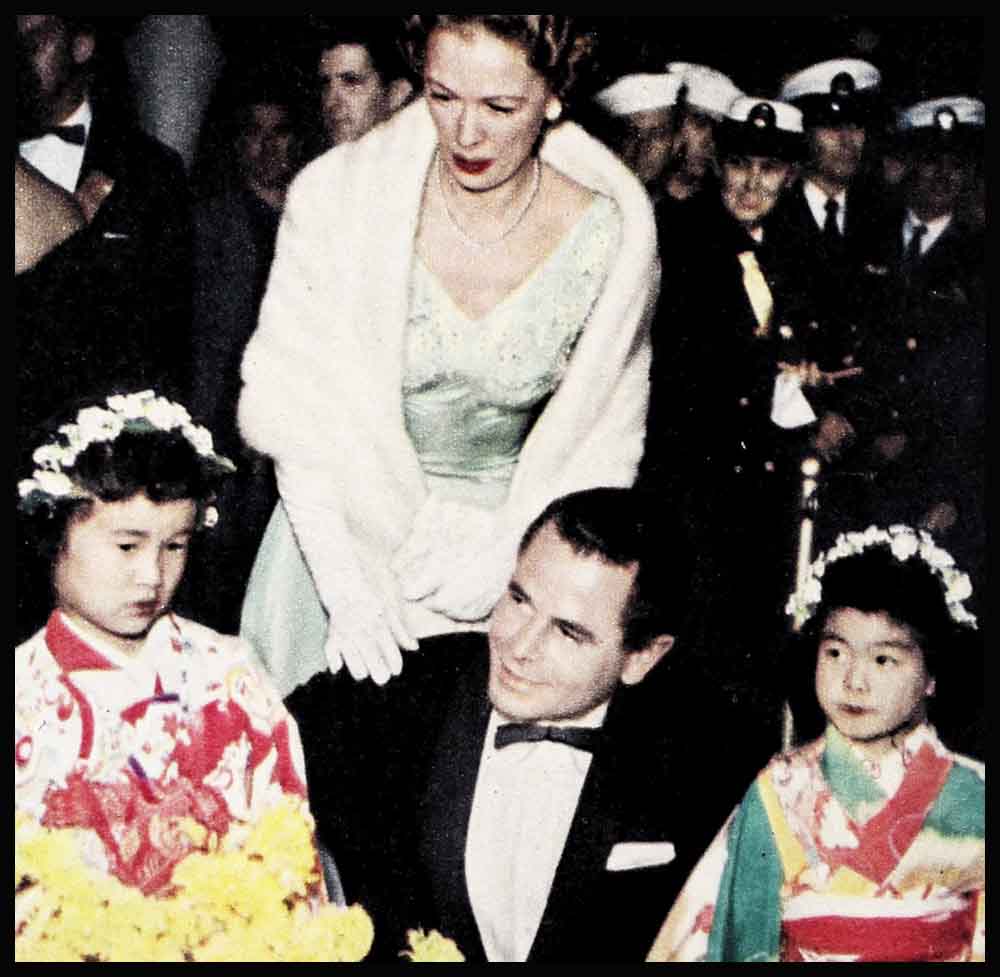
Exclusively Yours
Our Strangest Triangle: The bereft Michael Wilding is being consoled by Marlene Dietrich over losing Liz Taylor to another Mike named Todd. Behind this simple statement is a story stranger than all of fiction. About seven years ago, when Mike was at the peak of his screen career as Britain’s top leading man, he was borrowed by Alfred Hitchcock to play in a suspense thriller called “Stage Fright.” Appearing opposite him in the role of a “glamorous actress” was a glamorous actress named Marlene Dietrich. In one of the scenes, Marlene, lying sextactularly on a sofa, smothered in white maribou, confided in rich, sultry tones, “I’m the laziest gal in town!” But once the cameras stopped, there was nothing lazy about her approach to Mike.
Before the film had wound up, Mike had ask,ed Marlene to be his wife. Marlene turned down his proposal, not because of the divergence of their ages (she is attracted to men younger than herself) but for the simple reason that she was—and still is—married to Rudolph Sieber, the father of her only daughter, Maria. Although they have been separated for years, no man has come along for whom she has felt it necessary to seek her freedom—except temporarily as a romance. And so, when “Stage Fright” was finished, Marlene sailed back to America, leaving a lonely, unhappy Mike Wilding behind. But no attractive, unattached male, especially a popular film star, is allowed to be unhappy for long.
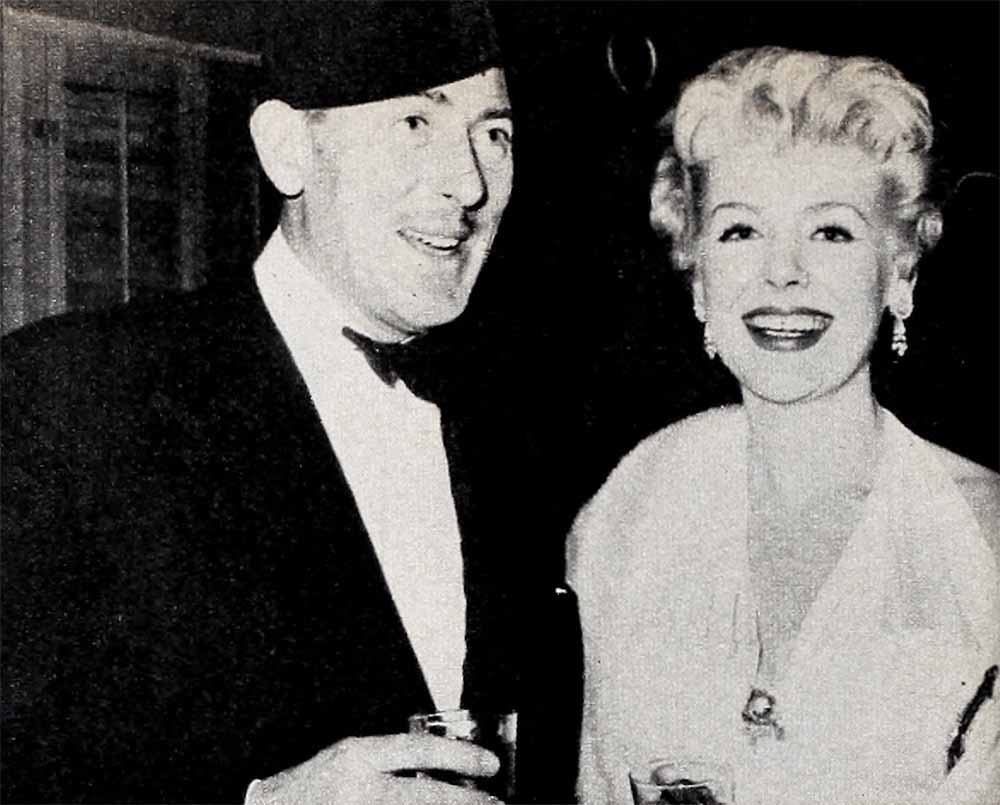
One night, shortly after Marlene’s departure, Mike was dining at Mayfair’s exclusive Les Ambassadeurs Club, when he suddenly found himself staring into the eyes of a dazzling beauty, as different from Marlene as two beautiful women can be. The inevitable happened and the rest is history. When Liz Taylor eventually asked Mike for a separation, the name lingered on in her life with another Mike—Mike Todd. Here again was a study in strange contrasts, this time between two men: Wilding, a reserved Britisher with a quiet, lazy charm, educated in the best public schools (only in England a public school is private), and Todd, volatile and explosive, a born gambler, recklessly extravagant, self-educated and self-made. And here is still another twist to this amazing story. Before Liz came into his life, Todd had persuaded Marlene to play herself as one of the guest stars in “Around the World in 80 Days.” Marlene had succumbed not only to Mike’s fast-talking salesmanship, but to Mike, himself, especially his generous purse.
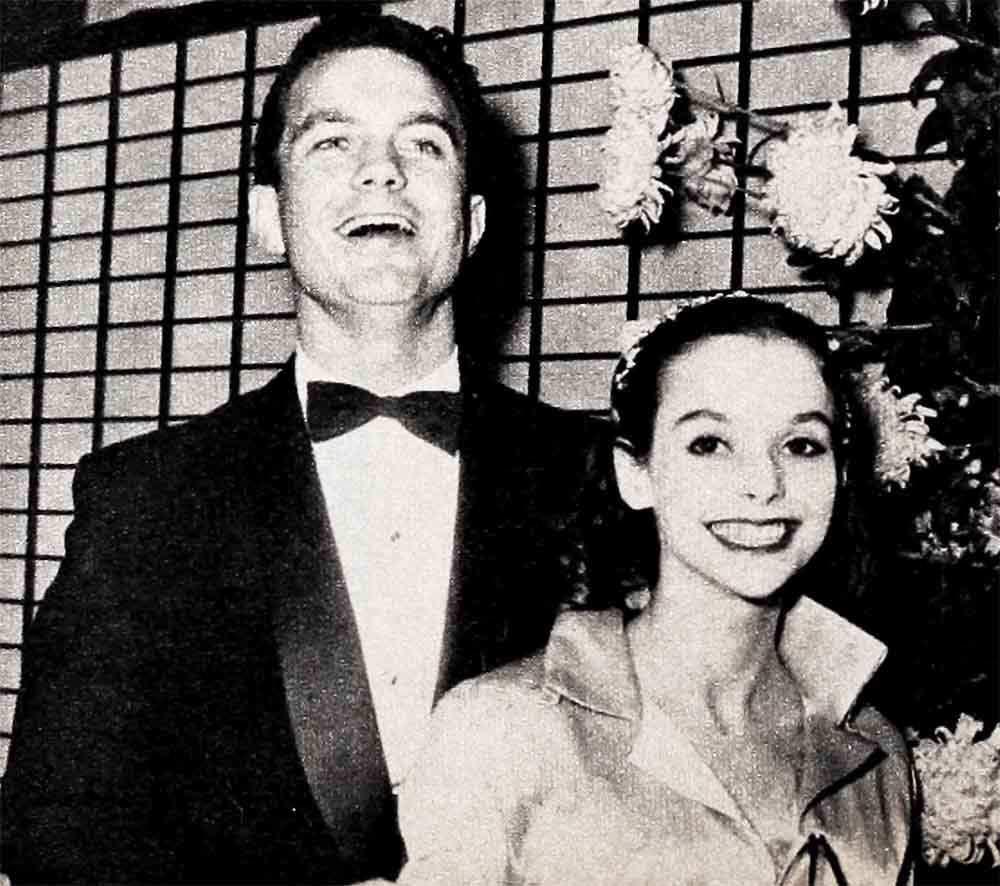
While Marlene was in Hollywood, filming “Around the World,” she and Mike were together constantly. On her return to New York, they were seen at all the first nights and other glamour spots in town. Then she left for the Riviera to make “The Monte Carlo Story” with Vittorio De Sica. The picture ran way over schedule and Marlene was miserable through most of it. Then she returned to New York for the gala opening of “Around the World,” only to discover that the “hot Toddy” she had left behind hadn’t cooled off. But now he was even hotter about Mrs. Mike Wilding, and it was she who decorated his arm at the premiere and midnight supper party afterward. Marlene was escorted by an old friend, Noel Coward.
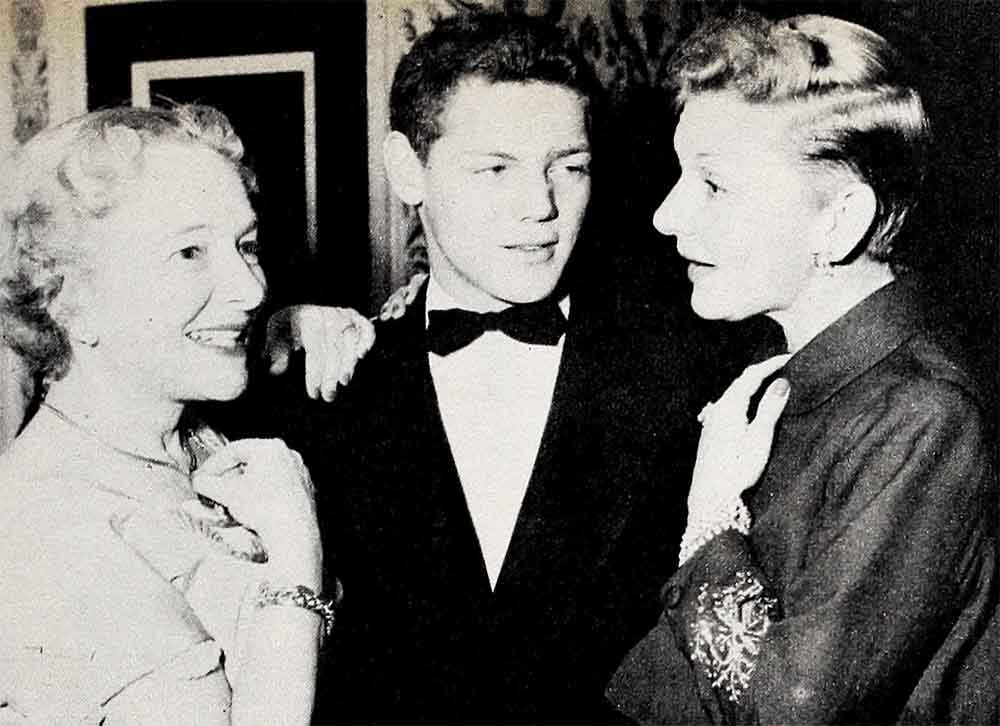
Then Marlene had to fly to Hollywood to see Jean Louis about another staggering wardrobe for her third appearance at Las Vegas. On her arrival, she heard that Liz had asked Wilding for a divorce. Call it good timing, call it destiny, or pure accident, or what you will, the fact remains that Marlene and her first Mike caught up with each other again at the precise psychological moment for both of them. Whether this reunion after a seven-year interlude will rekindle their former flame, and this time wind up at the altar, is anybody’s guess. But if it does, I predict they have a very good chance of making a go of it.
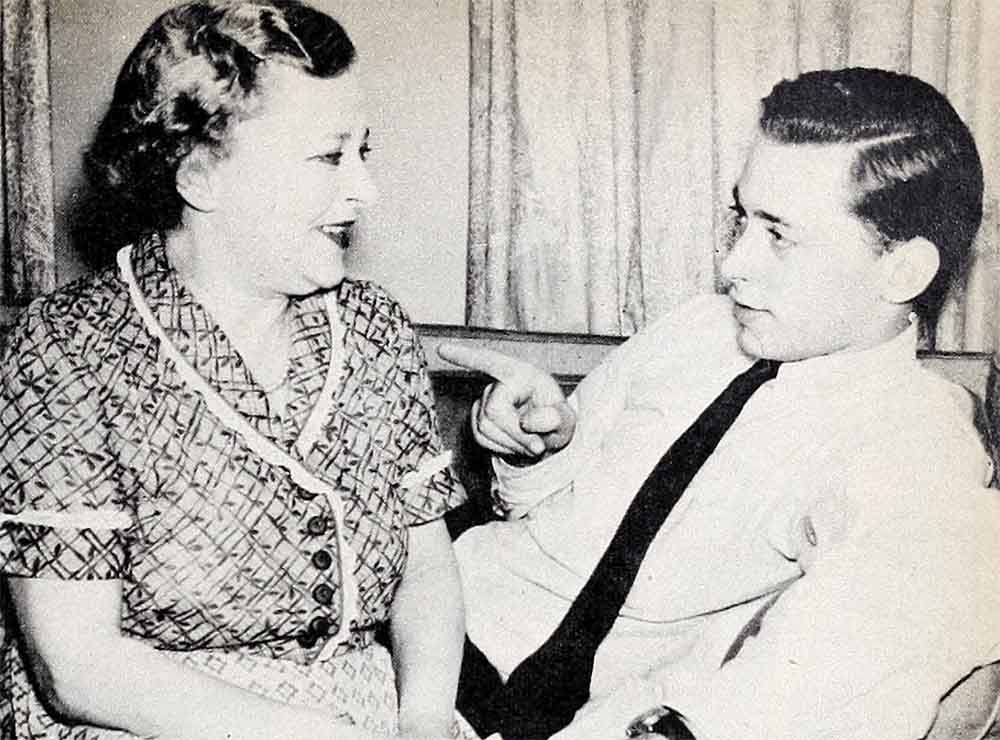
Mike needs a woman to dominate him. And don’t let Marlene’s femme fatale trappings fool you. Basically, she has the disciplined mind of a German officer with the soul of a German hausfrau. She is at her happiest when she can “mother” someone—man, woman or child—and she doesn’t care whether it takes the form of cooking, nursing, baby-sitting, or giving helpful advice. Some men—and I can name several—have been scared off by Marlene’s complete “taking over.” But not Mike. He’s the type of easygoing Britisher who needs someone like that. His first wife, Kay, now married to actor Douglass Montgomery, was the stronger of the two, and so was Liz Taylor. Only Liz’s dominance was in relation to herself. “Let’s leave here now,” she’d command at a party when she was tired. Marlene, on the other hand, would have whispered, “Darling, you look tired. Let’s go home and I’ll warm some milk for you.” And in all probability, while Mike is sipping his milk, Marlene will be massaging his neck and back with the efficiency of a trained masseuse, while at the same time she will be advising him what to say when he sees his agent in the morning. And he, in turn, will bring to Marlene the physical attraction of a younger man; a lack of temperament and ego, rare in an actor; two more little children to adore, and the security of love that every woman needs. Especially glamorous women like Dietrich, who are the loneliest in the world.
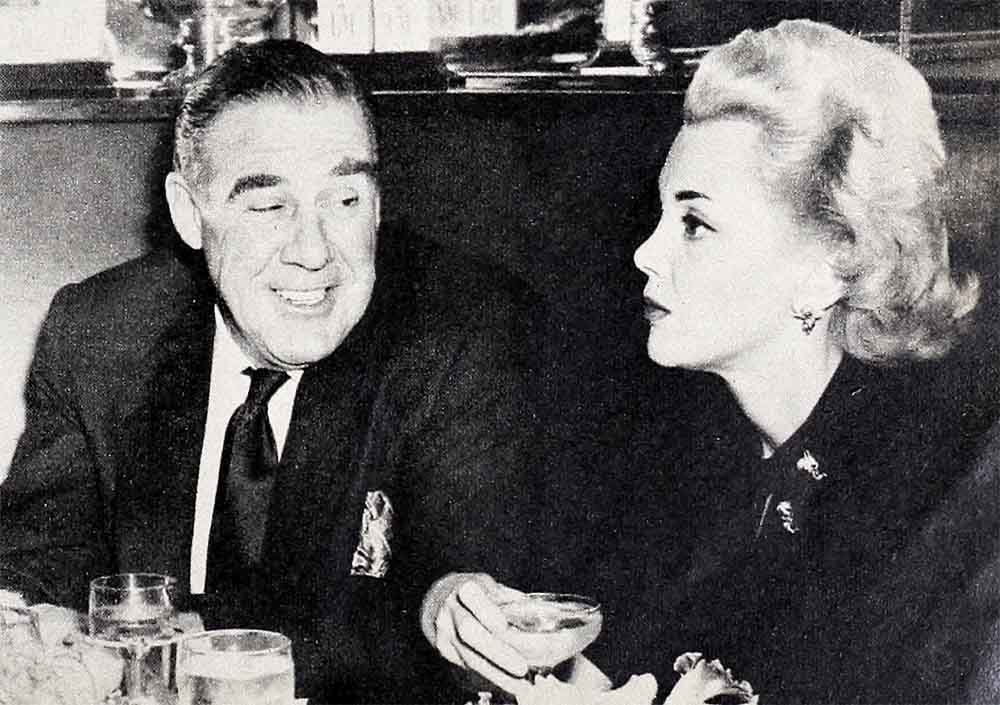
Footsteps to Glory: “Relatively” speaking, this is an amazing year. Practically every big Hollywood film and Broadway play can boast some relation of a famous parent who is making good on his or her own. Just consider a few: Tony Perkins, Susan Strasberg, Johnny Kerr, Jim MacArthur, Sidney Chaplin, Jack Merivale and Anna and David Massey. Tony, incidentally, adds to the merry-go-round by dating the daughter of a notable Hollywoodite: Maria Cooper, offspring of Gary. This fact helps to dispel the gloom of some of Tony’s fans, who wondered when he would come off his ivory perch for a real date. Perhaps the most notable event of this offspring wave is the great personal success scored by Charlie Chaplin’s son, who is making his Broadway debut in the Judy Holliday smash hit musical “Bells Are Ringing.” But Sidney’s father can take none of the bows for launching this stage career. It was Judy, and Judy alone, who insisted that Sidney be given the audition that finally won him the role of her leading man against competition from established names like Howard Keel and Johnny Johnston. She foresaw what all the drama critics “discovered” after the opening: that Sidney, with his dark good looks, effortless charm and stage poise (won after a long apprenticeship at the Circle Players in Hollywood, where he did everything, including sweeping the stage) would be a matinee heartthrob, younger and handsomer than Yul Brynner, Ezio Pinza and Rex Harrison.
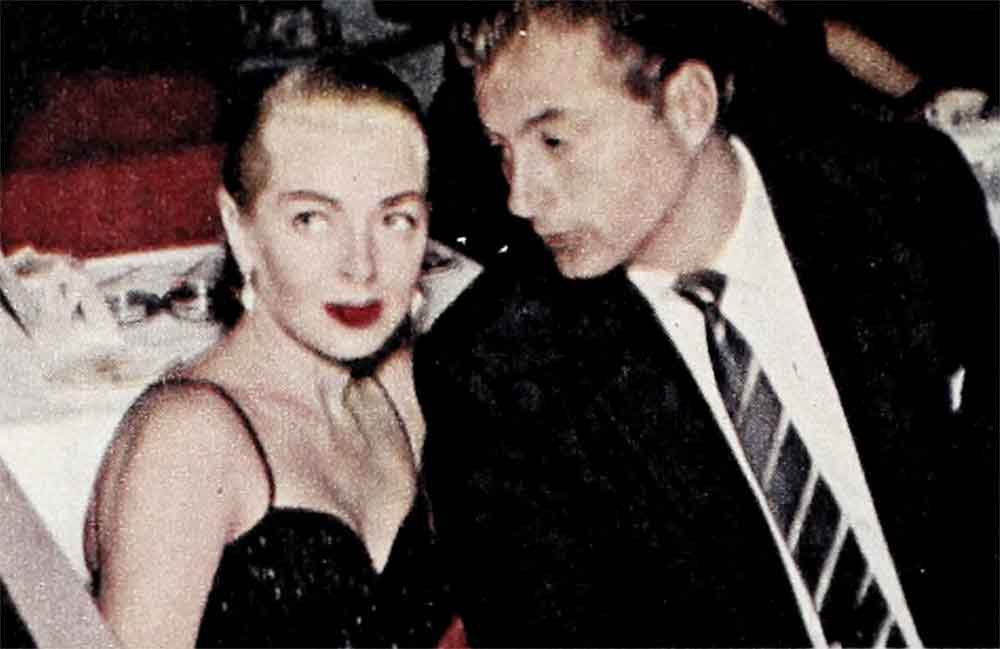

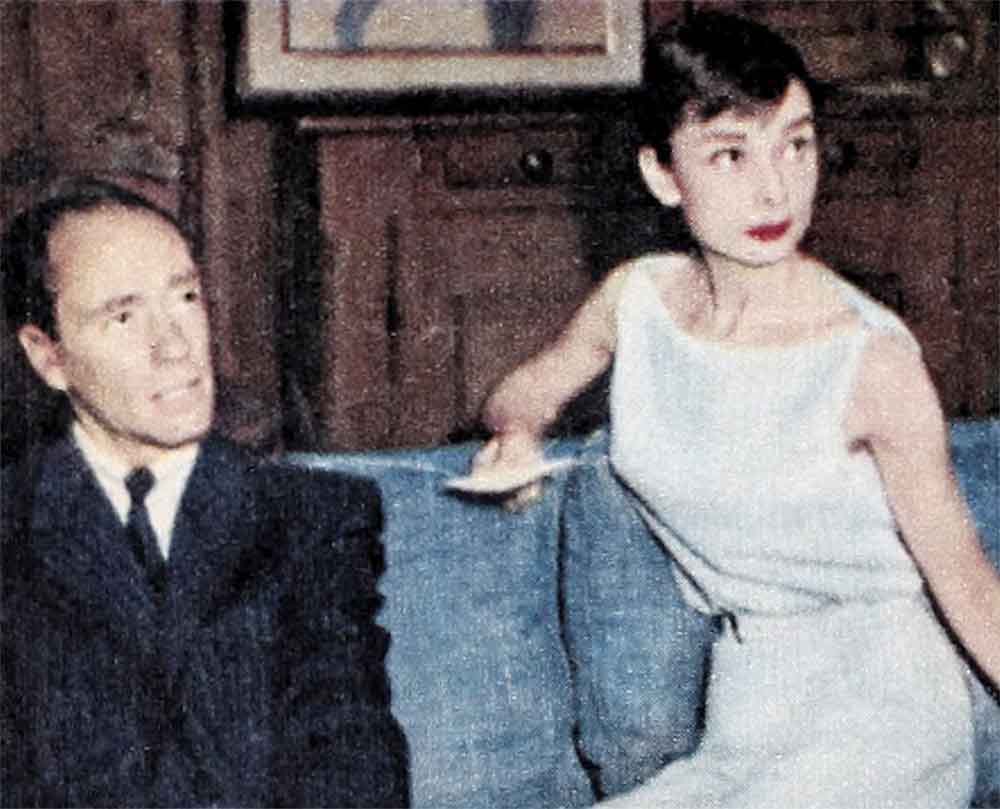
When Marlene Dietrich visits Hollywood, her first stop is the Van Johnsons’ to cook beef stroganoff and exchange the latest gossip
Audrey Hepburn takes being Mrs. Mel Ferrer very seriously. But, more importantly, is she taking her film star status too seriously?
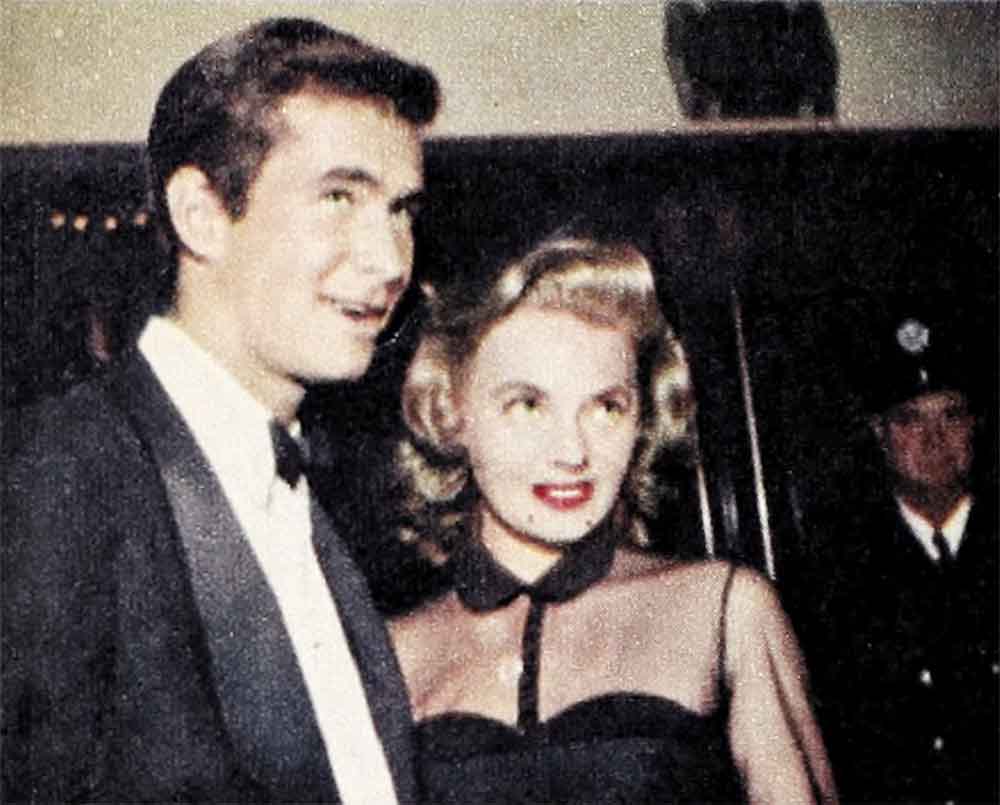
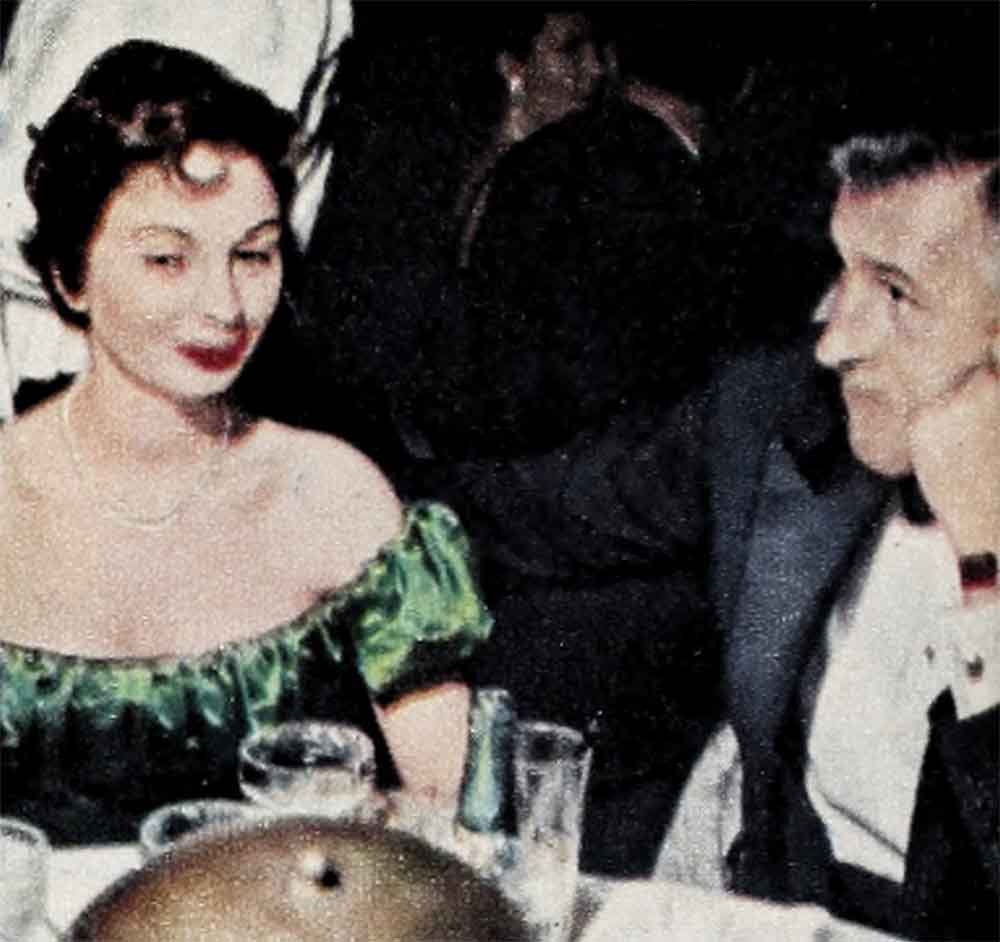
The Stewart Grangers confused all and sundry when they named their baby Tracy, had the press reporting their child was a son
Strangely enough, although he was completely ignored by Hollywood and equally overlooked in London, where he had gone hoping that his father’s homeland might give him a break, Sidney has always scored heavily in private life. Three of the loveliest bundles from Britain, Kay Kendall, Claire Bloom and Joan Collins, have fallen victim to his charm in the past. Now Judy Holliday is continuing to hear “bells ringing” after the show’s curtain rings down.
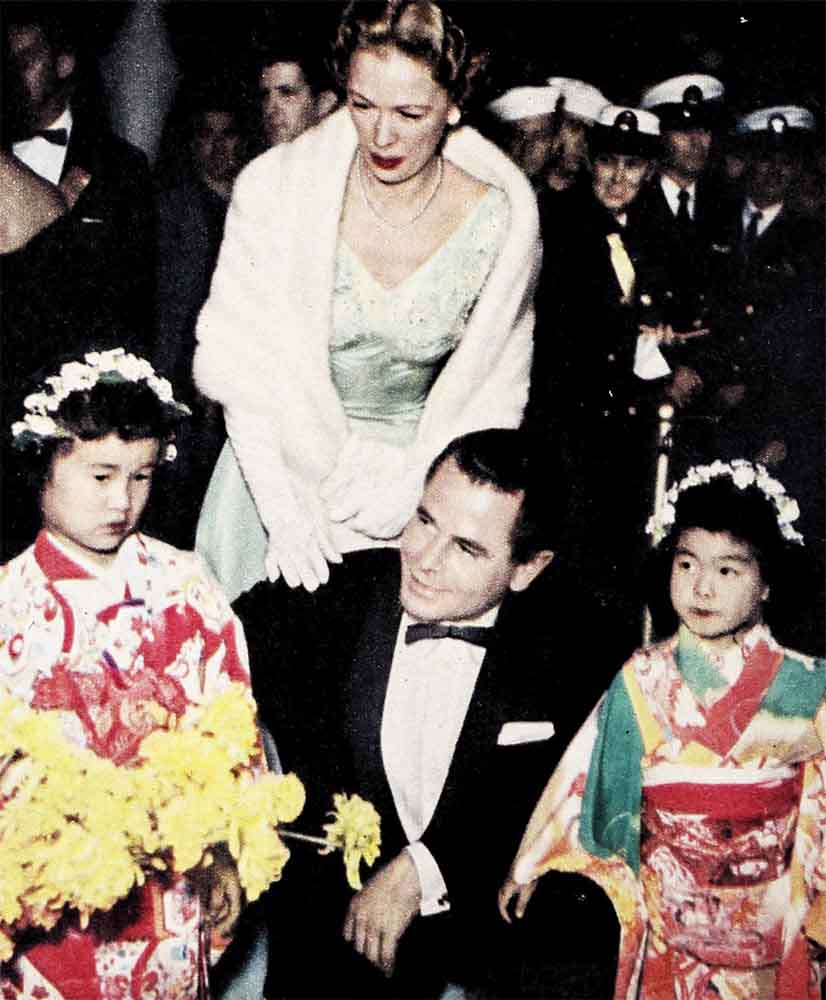
That Judy’s current romantic interest in her on-stage leading man will lead to the altar doesn’t seem likely to their intimates. For one thing, there’s the age difference between them, and secondly, Sidney is the type who believes there is safety in numbers. He’s playing it safe now as far as all women are concerned, by living as a bachelor but sharing his apartment with Adolph Green, who, with Betty Comden, wrote book and lyrics for “Bells.”
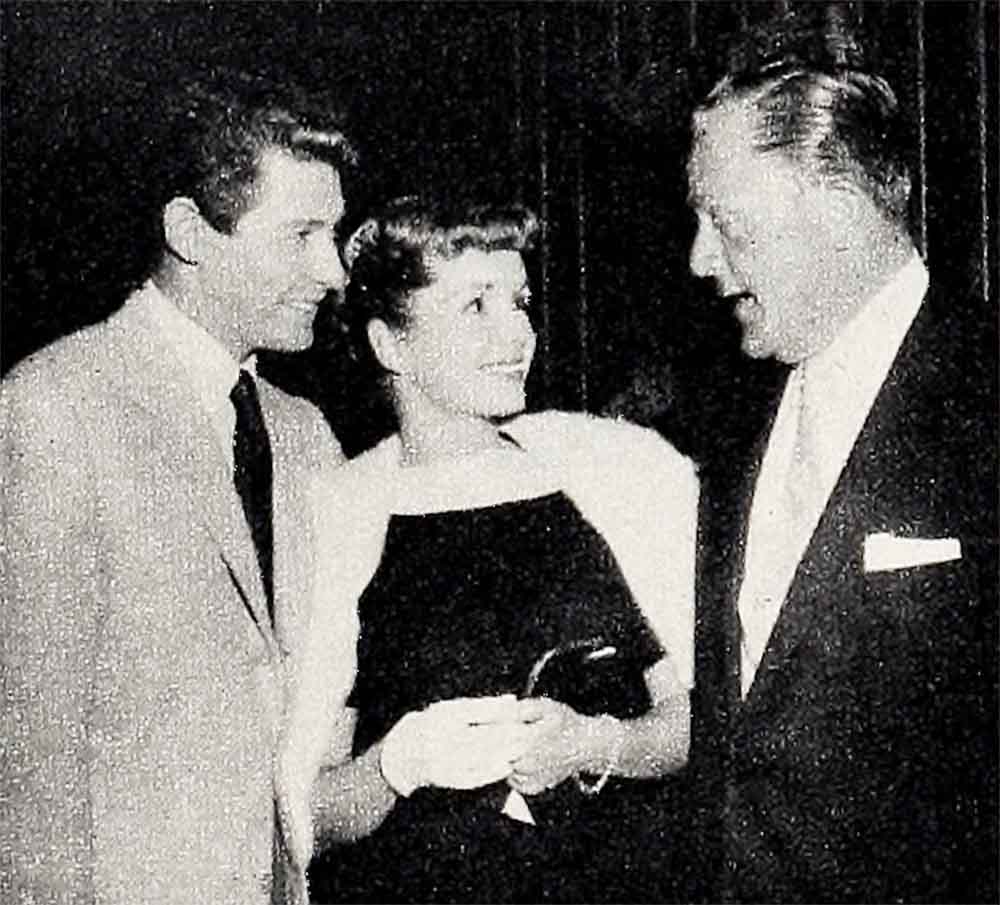
Stop the Press: How does Lana Turner feel about being off screen for so long? Friends feel she ought to be worried, but when she snuggles up to handsome, wealthy Lex Barker they get the idea that she couldn’t care less. . . . Jan Sterling has buckled down to a new diet and the results are a brand-new, lithe figure. Hubby Paul Douglas’ eyes, which always light up whenever Jan is around, shine brighter than ever at the sight of the new, new look. . . . Marlene Dietrich’s first stop when she arrives in Hollywood is at Van Johnson’s, where she stuffs herself on all the local gossip and pays off by preparing the tastiest beef stroganoff in town. . . . The fact that the Stewart Grangers’ baby girl, Tracy, was first reported as being a boy only makes them more aware how happy they are that their first-born is a pretty addition to the female sex. . . . There is no doubt that Audrey Hepburn thinks she can be both great wife and great actress at the same time. But close friends feel that she might be working just a mite too hard at both roles. . . . Glenn Ford got a great kick out of participating in the making of “Teahouse of the August Moon” in Japan, but after Ellie brushed the lotus blossoms off his lapels he was ready and content just to hang up his hat and laze around with the family for awhile.
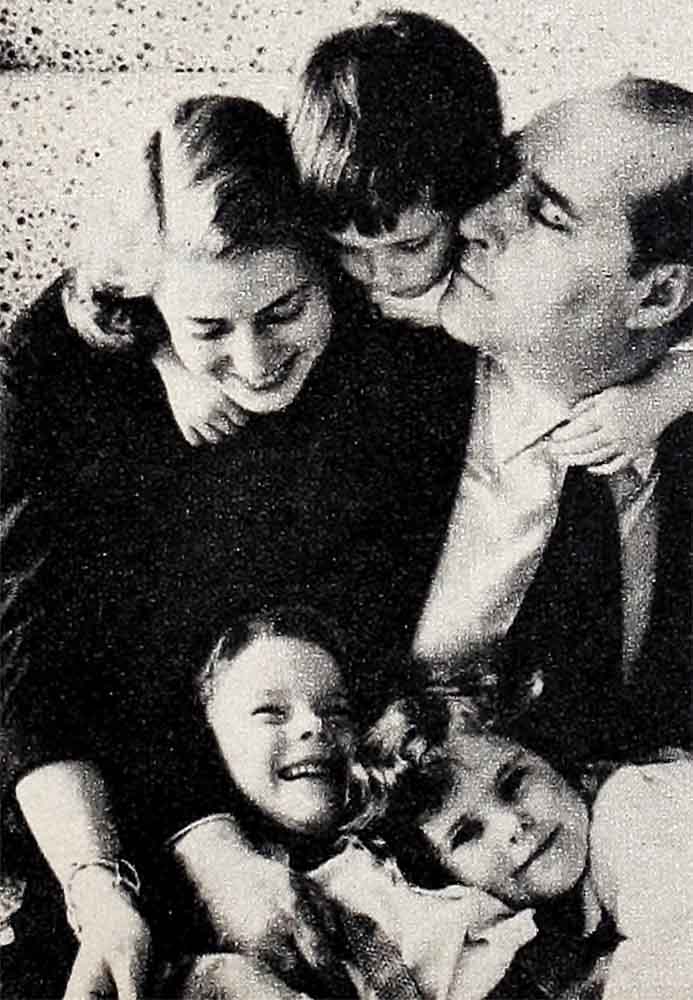
The Facts, Ma’am: Ever since Eddie Fisher married Debbie Reynolds, there have been rumors from the Hollywood grapevine that Debbie was trying to influence Eddie into dropping some of his business associates of the past, notably, his personal manager, Milton Blackstone. It was Blackstone, of course, who discovered Eddie when his was just a voice in the wilderness and helped skyrocket him to his present pinnacle of success. For Eddie to drop Milton now would be the kind of ingratitude that is “sharper than a serpent’s tooth.” No one is more aware of this man Eddie—which is why he is so indignant over this misplaced rumor, directed not only at himself but at his wife Debbie.
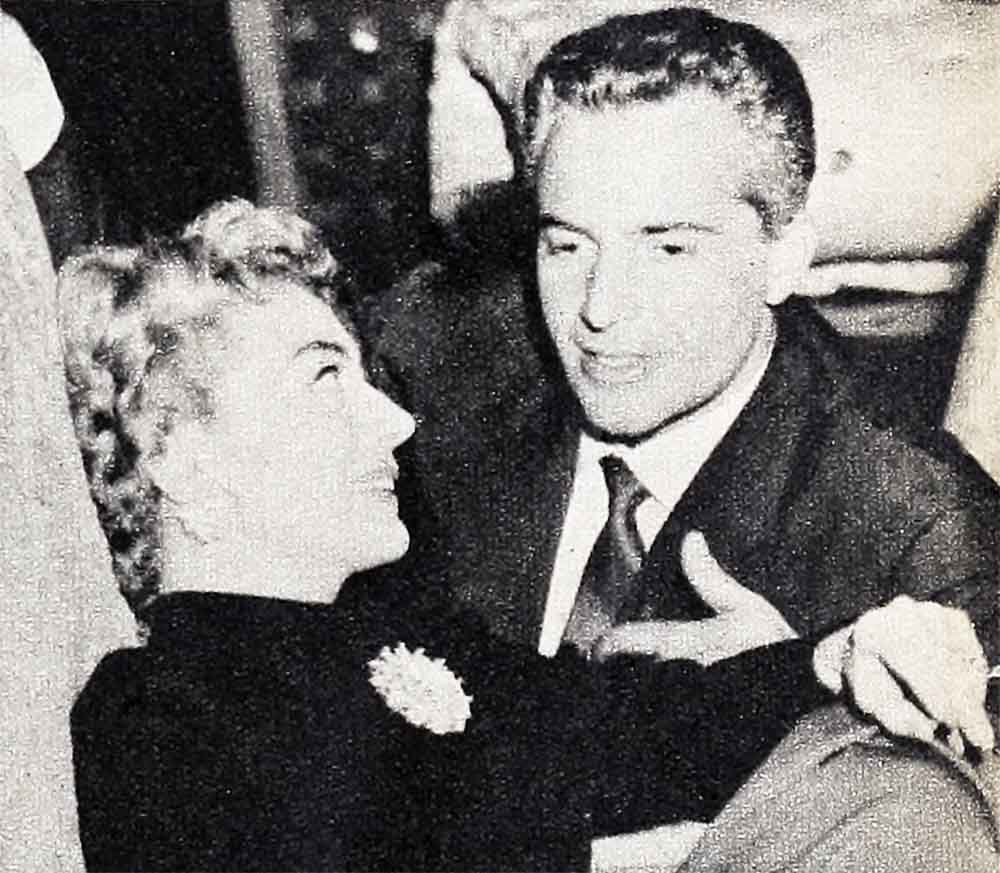
“Debbie has never at any time tried to impose any demands on me, as far as my career is concerned,” Eddie assured me when he came East for the press premiere of their first co-starring venture, “Bundle of Joy.” “And certainly she has far too much integrity as a person to want me to be disloyal to anyone who helped me in my struggling days. As far as Milton is concerned, sure, we’ve had our differences of opinion. Who wouldn’t, in a business relationship that involves so many decisions, so much long-range planning and pressure from all sides? But, as long as I live, I’ll never forget the debt of gratitude I owe to Milton. All rumors to the contrary, he is still my manager, and always will be, I hope.”
Proving this is not idle talk, Eddie insisted that the press preview of “Bundle of Joy” be held at Grossinger’s, in Liberty, New York, where Milton first spotted Eddie. Debbie couldn’t come East to be at the Grossinger premiere because she couldn’t leave her real “bundle of joy,” Carrie Frances, whom she was still nursing at the time, but Milton was at Eddie’s side and shared the honors with him. It was here, eight years ago, that a timid youngster from Philadelphia first sang his way into prominence.
Overseas Intelligence: Ingrid Bergman, actress, is continuing to bring tears to the eyes of spectators nightly for her sensitive portrayal in the French stage version of “Tea and Sympathy” in Paris. Rossellini, after seeing Ingrid’s opening (with teeth chattering, he was so nervous), and after staying to spend the holidays with his family, finally left for picture making in India—which, of course, immediately started those old, unfounded separation rumors. Six-year-old Robertino has entered a school in Paris and the twins are under the care of a French governess, who doubles as French teacher to Ingrid in the mornings. But she really doesn’t need the lessons. . . . Rossano Brazzi confided, just before sailing for America with his wife, Lidia, that he is determined to retire from the screen in 1960. Lidia’s comment about his reputation as the “great lover”: “Rossano just sells love. I wouldn’t be jealous of potatoes if he sold them for a living!” . . . Now that she is finished with Edmund Purdom (“too young for me,” she says), Linda Christian has been putting into effect her new resolve to stay away from married men. During her stay in Paris, she was seen about town with many handsome men, all of them single. Her phone was busy, too, with calls from as far off as Greece. Linda confessed that she is looking for a serious-type man to be a good father to her two daughters. . . . A new way of saying “we’re just friends” is writer Peter Viertel’s comment about his friendship with Rita Hayworth in Paris: “We share similar interests.” Before departing for America recently, Rita seldom left her Georges V Hotel apartment except to go dancing with Viertel. Dancing, she usually takes her shoes off.
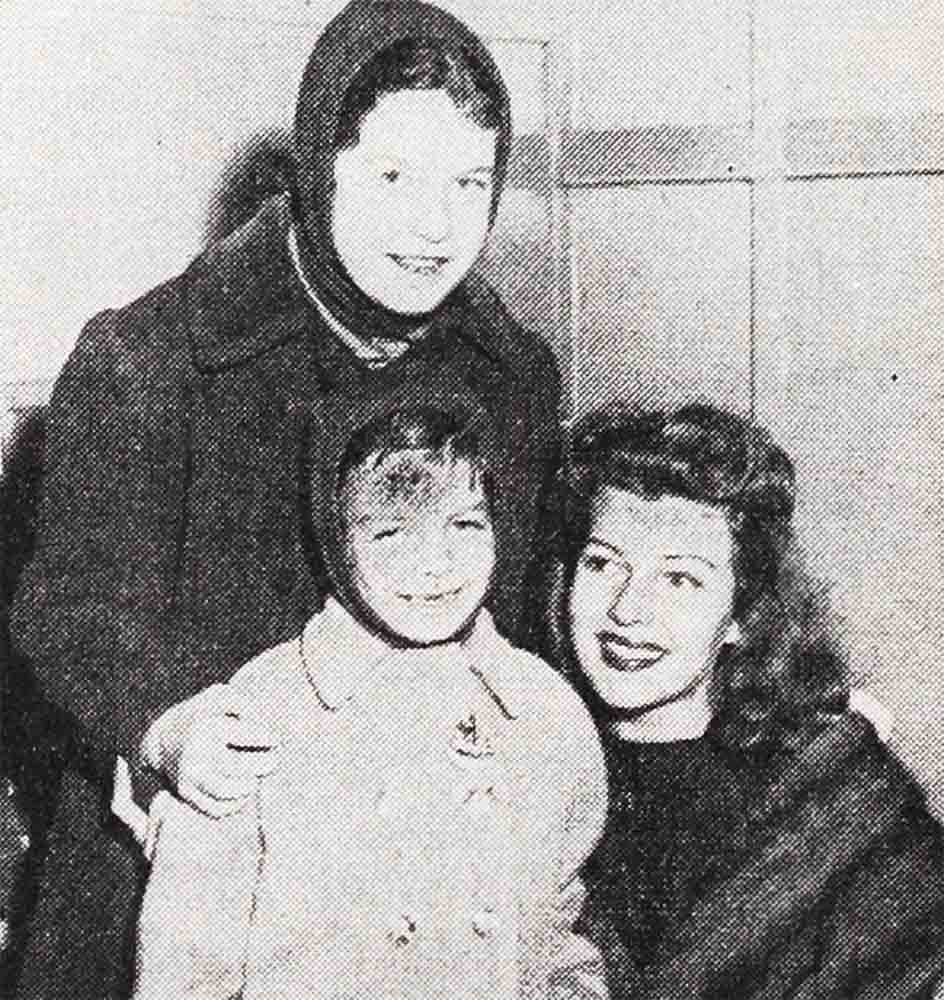
Tidbits about Tourists: Mr. and Mrs. Errol Flynn are taking a leisurely cruise in Mediterranean waters. . . . Dana Andrews made the entertainer and other patrons unhappy, at London’s swank Casanova Club, by talking loudly during the acts, despite admonitions from surrounding tables. Dana apologized to the singer later. . . . Merle Oberon dividing her time between the Earl of Dudley in London and a mysterious Frenchman in Paris. . . . Grace and Rainier are encouraging the people of Monaco to adopt as many Hungarian children as possible. They have made donations out of their pockets to Hungarian relief, in addition to official government donations.
New Personality of the Month: About a year and a half ago, before Susan Strasberg left for Hollywood to make “Picnic,” she was given a bon voyage party at the home of her godparents, Mr. and Mrs. Herb Moss. As someone who has known Susie ever since she was just a twinkle in her father and mother’s eyes, I had been invited to this gay gathering. Just as I was leaving, a young girl rushed over to Paula Strasberg to say goodbye, too. There was nothing spectacular about her looks—mousy brown hair, clean blue eyes and a general impression of sweet, scrubbed freshness. But Paula introduced us: “Radie, here is someone you should know. She’s our newest exciting discovery in the Actors Studio. Lee (Strasberg) and Gadg (Kazan) predict a brilliant future for her, so when she becomes famous, remember you met her here first!” And that’s how I met Carroll Baker, before her “Giant” screen success as a “Baby Doll.”
Shortly after Carroll came back from location in Mississippi, where all of this Tennessee Williams’ film was shot, we caught up. with each other over lunch. Despite the fact that her mousy hair was blonder now (although she was letting it grow back to its natural shade after bleaching it almost platinum for this second movie) and her slim figure had blossomed out considerably, due to the imminent arrival of a “baby doll” in the Jack Garfein nursery, I recognized her immediately. Neither George Stevens nor Gadg Kazan had tried to transform her into the usual mould of a Hollywood glamorpuss.
Carroll’s film career runs a striking parallel to another disciple of the Actors Studio, Eva Marie Saint. Eva won an Oscar for her prize performance in a Kazan-directed film, “On the Waterfront.” Carroll will be a strong contender in the Academy Award sweepstakes for her brilliant characterization of a “Baby Doll,” also directed by Kazan. Incidentally, neither film was made in Hollywood. Eva is married to M-G-M director Jeff Hayden. Carroll’s husband is Jack Garfein, who recently completed his first directorial effort for the screen, “End as a Man.” One coincidence Carroll won’t share with Eva: Should Carroll win her Oscar in March, she’ll accept it in a beautiful new gown, unlike Eva, who accepted hers in a maternity dress. But to add one more final parallel, Eva’s co-star in “On the Waterfront” was an actor who first exercised his talent at the Actors Studio—Marlon Brando. In Carroll’s first Warner Brothers’ film, “Giant,” she played opposite another famous Studio alumnus, the late James Dean.
All or Nothing: Speaking of lonely movie queens, take Ava Gardner, if Walter Chiari hasn’t already beaten you to it by the time this reaches print! When Ava was in London last summer filming “The Little Hut.” I visited her on the set and late: ran into her on the few occasions when she dined out. When Ava was seen supping at the Caprice or dancing at the Milroy, she was, naturally, the center of attention, and everyone speculated about who her good-looking escorts were. A couple of dukes or a lord or two, at least, lots of people were telling each other. How amazed they would have been had I introduced them to two American commoners named Sidney Guillaroff, Ava’s hairdresser at M-G-M and one of her closest Hollywood friends, and Morgan Hudgins, a Metro publicist, who had been on location with Ava in Africa for “Mogambo.” Grace Kelly took such a fancy to him, too, that when she married Prince Rainier, she borrowed Morgan from Metro as her chief press liaison at the wedding. Now he was back with Ava again, handling her publicity on “The Little Hut” and keeping her company when Sidney or Walter Chiari wasn’t available for the purpose.
Ava, who is well accepted in Europe, has been presented by the manager with a special winter-season pass for the performances at the La Scala opera house in Milan. Milan, of course. is Walter Chiari’s home town. Incidentally, speaking of Ava, a London tailor hasn’t recovered yet from a recent visit from Ava (who flits between London, Paris, Rome, Milan and Madrid as easily as if she were commuting from downtown L. A. to Beverly Hills). Ava arrived at this exclusive men’s tailor shop, which caters to all the old aristocracy, and asked them to make her some slacks of material she gave them. But Ava specified that they be made very tight, and to make sure, she preferred to have them fitted next to her bare skin.
Ava met Chiari in Rome shortly after she had run into Frank Sinatra in Madrid, where he and Cary Grant were filming “The Pride and the Passion.” It was the first time their paths had crossed since their final split-up, and Frank, who had once been so insanely in love with her that nothing else mattered—not even his home, children or career—had looked at Ava as impersonally and emotionlessly as if she were a part of the scenery. It was a cruel blow, not only to her vanity, but to her heart, which still held so many intimate memories of him. After that, she was grateful for the opportunity to leave Madrid to Frankie and bullfighter Luis Dominguin, who had succeeded him in her affections, and was now married to someone else. In Rome, where there were no ghosts of the past to haunt her, she might find the happiness that has eluded her with three husbands and a great career.
Will Walter Chiari, a tall, dark and handsome Italian, who makes his American screen debut in “The Little Hut,” be the answer to her prayer? My guess is no, and I base it on a statement that Ava herself made in a recent interview when she confessed, ‘I’m bad in only one thing. I’m jealous. I’m very jealous. I want my man to love me—just me—that’s all.” For any wife to be jealous is a dangerous threat to marriage, but with a Continental like Chiari, this “only one thing” is the kiss of death. In Italy, as in most of Europe, a husband is Lord and Master. His wife marries him to grace his house, breed his children, adopt his family, share his religion and love him, blind to his faults but aware of all his virtues! A woman who was raised in Italy can often accept marriage on such a basis, not only because this is an accepted marital relationship, but also because she knows that if she doesn’t, the chances of her getting a divorce in a Catholic country are almost nil. Consequently, for a female like. Ava, who admits her overpoweringly jealous nature, to marry a charming actor, well known throughout Italy, would be disastrous—and I say this because I have met him. He has the Continental charm and technique of making a woman feel she’s a woman, and, like all Italians, he can no more help flirting than he can help breathing. F. Hugh Herbert and Mark Robson have signed him, by the way, to a personal contract and have great plans for his future in American films.
How will Ava, who admits she doesn’t want to share her man with anyone, reconcile herself to sharing his popularity—especially with the opposite sex? The answer is, she won’t! And how will Chiari put up with her accusing rages of jealousy? The answer is, he won’t. They’ll wind up destroying each other, just as she and Frankie did. I only hope that some day, before it is too late, Ava will find the happiness she craves and is so desperately searching for. But she will only find it, if she chooses a man whose values she shares and if she doesn’t try to grab happiness all for herself, but remembers that in marriage there are three lives—yours—your husband’s—and the life you will share with each other.
THE END
It is a quote. PHOTOPLAY MAGAZINE MARCH 1957




